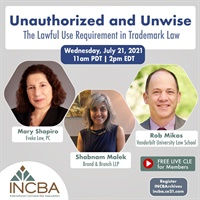Before you Buy: Check the Credit Tab to Make Sure Your Jurisdiction is Accredited!

- Average Rating:
- 2
- Categories:
- Business of Law | Cannabis | Ethics | Hemp | Litigation | Mindfullness | Social Equity | Substance Abuse
- Faculty:
- Hannah Stitt | Paige Pembrook | Jonathan Gallo | Lauren Linder
- Duration:
- 48 Minutes
- Format:
- Audio and Video
- SKU:
- INCBA08122021OD
- License:
- Short Description:
- After becoming a cannabis lawyer, you need to ensure you are an ethical one. Learn from our panelists about the issues they confronted as soon as they entered cannabis practice, and what they never expected.
- Price:
- $30.00 - $75.00

- Average Rating:
- 1
- Bundle:
- CLI2023 Interstate Commerce Bundle | CLI2023 On-Demand
- Categories:
- Interstate Commerce
- Faculty:
- Rafi Aliya Crockett, CAMS | Caroline J. Lambert, Esq. | Matt Lee | Adam Smith
- Duration:
- 53 Minutes
- Format:
- Audio and Video
- SKU:
- INCBA072023statehousesOD
- License:
- Short Description:
- Interstate Commerce in Statehouses and the Courts: What Will Ultimately Bring About the Onset of Interstate Sales? At least four states have seen legislative action involving ways that interstate commerce can be triggered prior to full federal legalization, namely California, Oregon, New Jersey, and blank. This panel will explore the potential triggers that could unlock interstate sales, as well as how the lack of movement at the federal level factors into states' decision-making and operators' risks.
- Price:
- $30.00 - $75.00

- Average Rating:
- Not yet rated
- Categories:
- Administrative Law | Business of Law | Cannabis | Cannabis Law Sessions | Ethics | Intellectual Property | Licensing and Permitting
- Faculty:
- Matthew A. Goldberg | Michelle Mabugat | Jonathan Robbins | Shoran Williams
- Duration:
- 54 Minutes
- Format:
- Audio and Video
- SKU:
- INCBA08122021OD
- License:
- Short Description:
- Entering cannabis practice will require specialized retainer agreements, advisal letters, and conflict waivers. Our panelists explain in detail.
- Price:
- $30.00 - $75.00

- Average Rating:
- 7
- Bundle:
- Litigation Symposium 2023 On-Demand Bundle
- Categories:
- Litigation
- Faculty:
- Stacey Jackson | Ian Stewart | Jasmine Wetherell | Bryna Dahlin
- Duration:
- 55 Minutes
- Format:
- Audio and Video
- SKU:
- INCBA032123liabilityOD
- License:
- Short Description:
- Evolving cannabis product risks have the potential to result in enormous future liability for which cannabis and hemp companies are currently unprepared. This session will clarify those risks and discuss how embracing a mix of legal reform, policy changes and adoption of traditional risk management principles may prevent future product risk issues from damaging market sustainability.
- Price:
- $30.00 - $75.00

- Average Rating:
- 9
- Bundle:
- Litigation Symposium 2023 On-Demand Bundle
- Categories:
- Litigation
- Faculty:
- Daniel Koffmann | Jessica C. McElfresh | Amy McGahan
- Duration:
- 55 Minutes
- Format:
- Audio and Video
- SKU:
- INCBA032023crisisOD
- License:
- Short Description:
- Crisis communications for cannabis companies; media messaging; attorney-client privilege with consultants and public relations companies
- Price:
- $30.00 - $75.00

- Average Rating:
- 7
- Bundle:
- Litigation Symposium 2023 On-Demand Bundle
- Categories:
- Litigation
- Faculty:
- Meital Manzuri | Julia Beskin | Stephen Libowski
- Duration:
- 55 Minutes
- Format:
- Audio and Video
- SKU:
- INCBA032123securitiesOD
- License:
- Short Description:
- This program will address current trends in cannabis securities litigation. Participants can expect to receive information on a variety of cannabis-related securities cases, including the most recent of such cases, which was filed in April 2022. Participants will learn about the current strategies taken in securities actions through cases at varying stages of litigation. Upon completion of this program, participants should expect to be able to identify common causes of action levied against cannabis-related entities and strategies those entities can implement to mitigate risk.
- Price:
- $30.00 - $75.00

- Average Rating:
- 6
- Bundle:
- Litigation Symposium 2023 On-Demand Bundle
- Categories:
- Litigation
- Faculty:
- Henry Wykowski | Jason Horst | Jennifer Fisher | Nicole Phillis
- Duration:
- 56 Minutes
- Format:
- Audio and Video
- SKU:
- INCBA032123courtsOD
- License:
- Short Description:
- Cannabis-related cases are making their way into federal courts. Learn how some courts are developing a framework for handling these cases.
- Price:
- $30.00 - $75.00

- Average Rating:
- 2
- Bundle:
- CLI2023 Federal Policy Bundle | CLI2023 On-Demand
- Categories:
- Federal Law | Regulation law | Regulations | Regulatory
- Faculty:
- Reggie Babin | Shanita Penny | David Culver | Bryan Barash
- Duration:
- 56 Minutes
- Format:
- Audio and Video
- SKU:
- INCBA072023fedcannOD
- License:
- Short Description:
- Federal Cannabis Legislation and Regulation. Attend this session for an overview of developments in federal cannabis legislation and regulation. Panelists will address new bills, reintroductions, and what is likely to move.
- Price:
- $30.00 - $75.00

- Average Rating:
- 2
- Bundle:
- INCBA’s Cannabis Law Crash Course Bundle
- Categories:
- Administrative Law | Cannabis | Federal Law | Regulation law | Regulations
- Faculty:
- Matt Zorn | Shane Pennington | Marisa Malek
- Duration:
- 56 Minutes
- Format:
- Audio and Video
- SKU:
- INCBA08152021CFROD
- License:
- Short Description:
- How is Cannabis regulated at the federal level and how did we get here? What lessons have we learned from the regulation of hemp?
- Price:
- $30.00 - $75.00

- Average Rating:
- 21
- Categories:
- Business | Copyrights and Trademarks | Federal Law | Intellectual Property | IP law
- Faculty:
- Robert Mikos | Shabnam Malek | Mary Shapiro, JD, MBA
- Duration:
- 56 Minutes
- Format:
- Audio and Video
- SKU:
- INCBA072121UNOD
- License:
- Short Description:
- This CLE explores whether a mark owner has used its mark to sell improperly labeled soap or an illicit drug, the PTO has no mandate, and no convincing policy reason, to deny the owner the substantial benefits of registration.
- Price:
- $30.00 - $75.00

Product Type

Product Type
- Faculty:
- Rafi Aliya Crockett | Caroline J. Lambert | Matt Lee | Adam Smith | Reggie Babin | Shanita Penny | David Culver | Bryan Barash

Product Type

Product Type

Product Type
Please wait ...